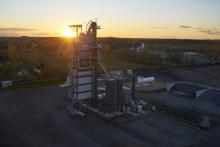BDS has published an updated and extended version of its Survey of the cement industry in Great Britain, first published in 2016.
The refreshed report, published last month, updates information on market trends, estimates of market shares of producers, end-use and distribution models, regional analysis, developments in new, upgraded and extended facilities and future prospects. A new section also examines investment, innovation and development opportunities and strategies for cement companies.
In 2018, almost 12 million tonnes of cement were sold in Great Britain of which almost 80% came from domestic production and the remainder from imports. A further 3.5 million tonnes of cementitious material, in the form of fly ash (also known as PFA or pulverised fuel ash) and ground granulated blast furnace slag cement (GGBS).
The importance of imported cement to downstream users - comprising chiefly producers of ready mixed concrete, concrete products and mortar - has grown over the last five years by 73% (at current prices) to over £240 million. As a whole the industry is worth around £1 billion with estimates of gross added value (GVA) in the region of £400 million.
There are 11 cement plants currently in operation in Great Britain operated by five companies namely
The report will be of use to all companies involved in the production and supply of cementitious products as well as industry observers, potential investors and end-users. The sector is a key element in the supply chain to deliver the Government’s plans to boost housing and infrastructure spending into the next decade.
Further details are available by contacting Andy Sales at BDS Marketing on (01761) 433035 or %$Linker:





